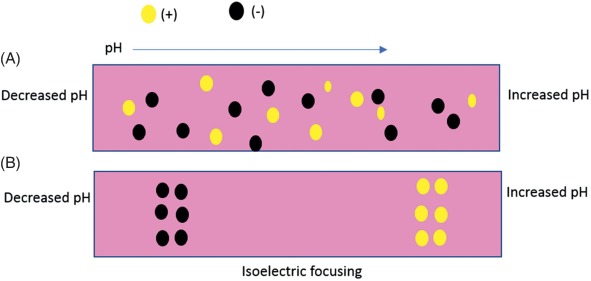Recombinant Collagen Isoelectric Point Determination Service
Recombinant Collagen Isoelectric Point Determination Service is an analytical service that uses isoelectric focusing (IEF) and other techniques to accurately analyze the focusing position of recombinant collagen in different pH gradients to obtain its isoelectric point (pI). It can be used to evaluate the expression integrity, modification status, charge heterogeneity of collagen, and the effects of expression system or process parameters on its electrochemical properties.
The pI of a protein refers to the pH value at which the protein carries no net charge in a solution. When the pH of the solution equals the protein’s pI, the protein will no longer migrate in the electric field, resulting in precipitation or focusing. The isoelectric point is determined by the number and types of acidic and basic amino acid residues in the protein and is a key physicochemical parameter reflecting the protein's charge properties, solubility behavior, stability, and functional activity.
For recombinant collagen, its isoelectric point is influenced not only by the amino acid sequence but also by post-translational modifications (such as hydroxylation and glycosylation), chain type (α-chain, β-chain), and various other factors such as the expression system. Therefore, accurate determination of the pI is crucial for quality control, functional evaluation, and process development of collagen.

Akash MSH. et al. Green Sustainable Process Chem Environ Eng Sci. 2023.
IEF is a highly effective technique for analyzing the pI of proteins. It works on the principle that proteins migrate in a pH gradient to their pI and focus at that position, allowing for precise detection of the protein's pI. Based on IEF and related techniques, MtoZ Biolabs offers Recombinant Collagen Isoelectric Point Determination Service to accurately measure the pI of recombinant collagen from different sources and with various modification states. This service not only provides essential quality control data for clients but also supports product development, process optimization, and clinical applications.
Analysis Workflow
The main steps of Recombinant Collagen Isoelectric Point Determination Service based on IEF are as follows:
1. Sample Preparation
Perform concentration measurement and buffer exchange for the sample.
2. Buffer System Selection
Choose an appropriate pH gradient system based on the estimated pI value and sample characteristics.
3. Isoelectric Focusing Experiment
Run the focusing process under set voltage and time conditions, allowing the protein to focus at its isoelectric point and form stable bands.
4. Visualization and Detection
Use gel staining to record the results.
5. Data Analysis and Comparison
Calculate the pI value of collagen by comparing it with the positions of the isoelectric point standards; if multiple bands are observed, further investigate the presence of modifications or isoforms.
Service Advantages
1. High Resolution and Precision: Capable of distinguishing minute charge differences, ensuring accurate determination of recombinant collagen's isoelectric point.
2. Applicable to Various Collagen Types: Suitable for various recombinant collagen types, including single-chain collagen, dimers, polymers, and tag-fused collagens.
3. Compatible with Different Expression Systems and Modification States: Adaptable to collagens produced in different expression systems (e.g., E. coli, yeast, etc.) and capable of detecting charge differences caused by modifications.
4. One-Time-Charge: Our pricing is transparent, no hidden fees or additional costs.
Sample Submission Suggestions
Sample Type: Purified recombinant collagen, either lyophilized powder or solution.
Sample Quantity: It is recommended to provide at least 50 μL of solution (concentration 1-10 mg/mL) or 10 mg of lyophilized powder.
Storage and Shipping: Store at -80°C and ship with dry ice, avoiding repeated freeze-thaw cycles.
If there are special requirements or uncertainties regarding sample preparation, please contact us, and we will provide specific guidance.
Applications
Recombinant Collagen Isoelectric Point Determination Service can be applied to various fields, including:
Quality Control and Consistency Verification
Ensure that recombinant collagen from different batches has the same isoelectric point, verifying its quality consistency and stability.
Process Optimization and Development
Help assess how different expression systems or purification methods affect the isoelectric point of collagen, optimizing production processes and improving product quality.
Post-Translational Modification Assessment
Detect how post-translational modifications of collagen affect its charge distribution and isoelectric point, thereby influencing its functionality.
Cell Compatibility and Functionality Research
Evaluate collagen's solubility, stability, and interactions with cells under different pH conditions through isoelectric point analysis.
Deliverables
1. Experimental Steps
2. Relevant Experimental Parameters
3. Detailed Isoelectric Point Analysis Information
4. Electrophoresis Images
5. Raw Data
How to order?







